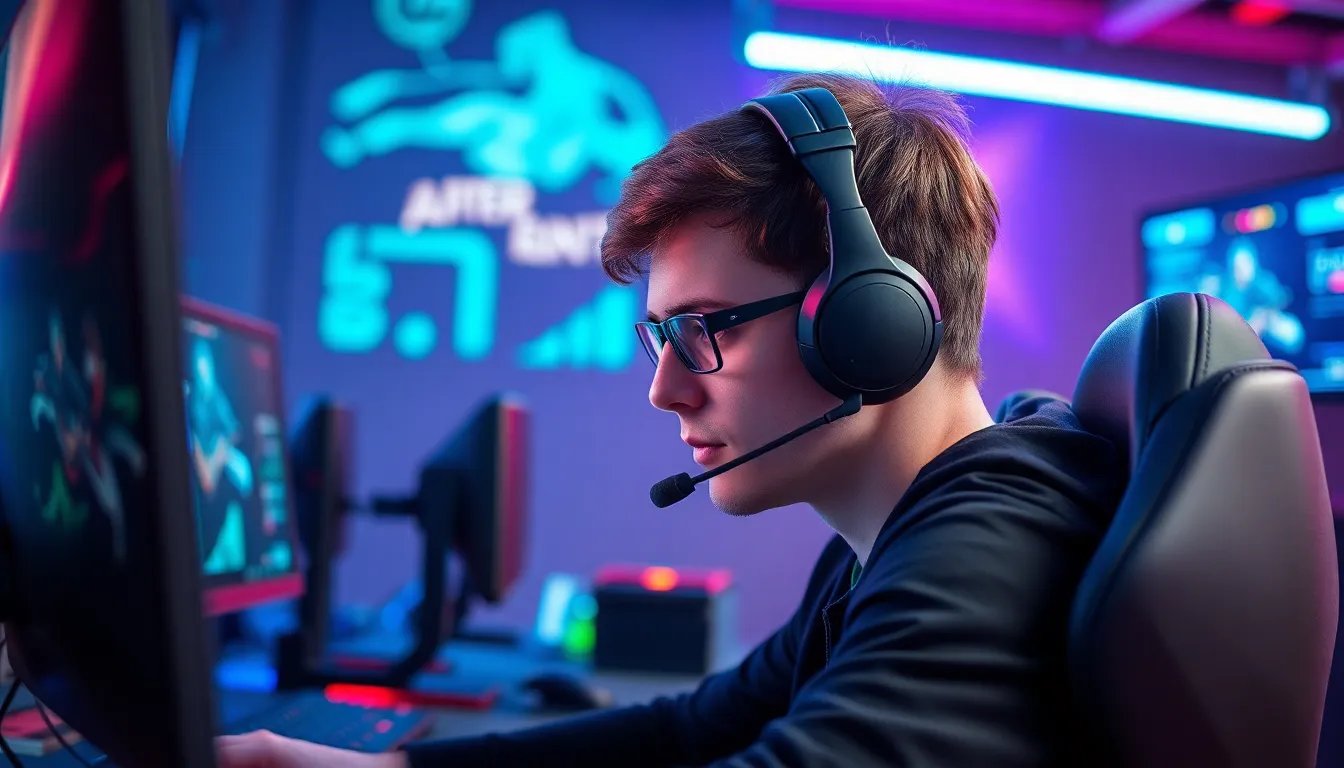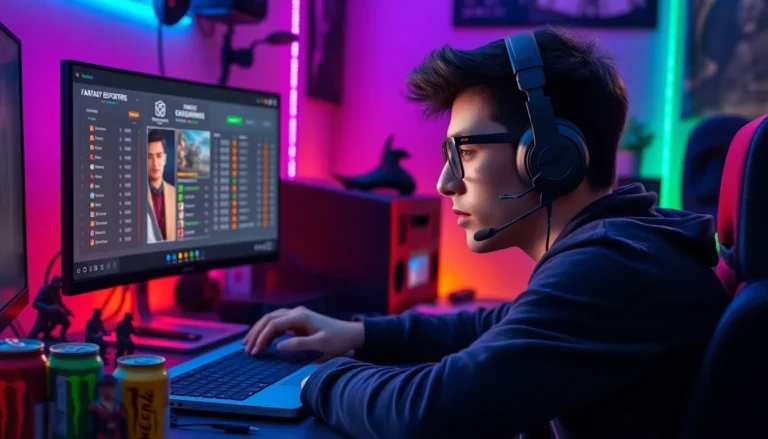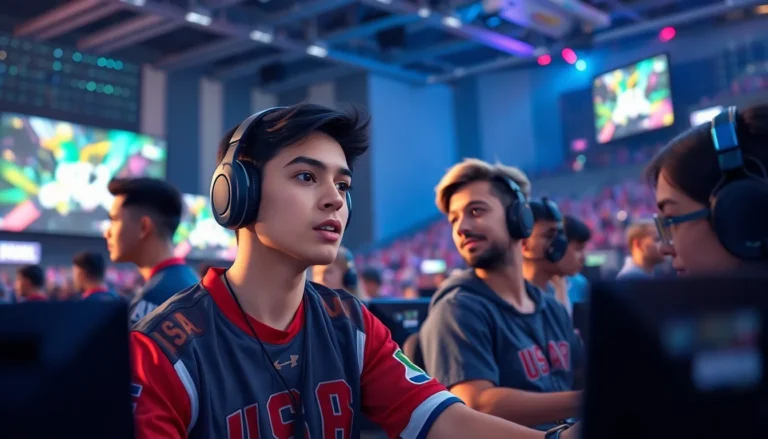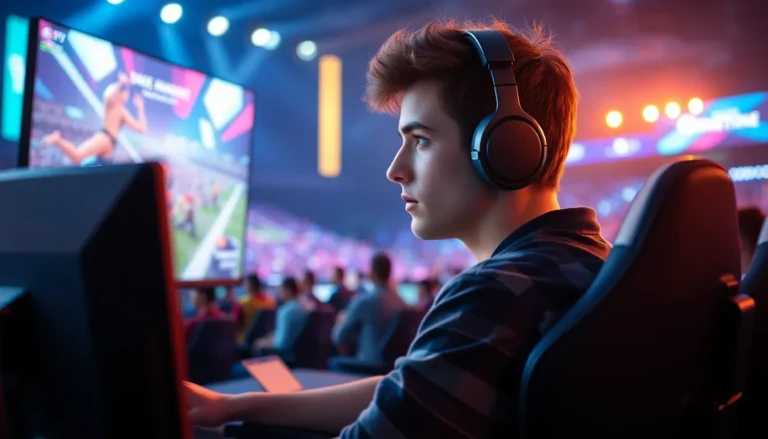In a world where gaming has evolved from basement dwellers to global superstars, pro gamers are rewriting the rules of success. They’re not just playing for fun; they’re raking in millions, basking in fame, and proving that hitting the right buttons can lead to a life of luxury. Who knew that mastering the art of headshots and combo moves could turn someone into a household name?
But it’s not all about flashy tournaments and sponsor deals. Behind the scenes, these digital athletes train harder than most Olympians, dedicating hours to perfecting their craft. They juggle intense competition, fan expectations, and the occasional cat video that distracts them during a crucial match. So buckle up as we dive into the fascinating world of pro gamers, where pixels meet passion and every click could be the difference between glory and defeat.
Pro Gamers
Pro gamers compete in video games at a professional level. These individuals participate in organized tournaments and leagues, showcasing their skills to a global audience. Expertise in specific games like League of Legends, Dota 2, and Fortnite often marks their careers. Successful pro gamers frequently earn income through sponsorships, streaming, and direct competition prizes.
Time and dedication to practice distinguish them from casual gamers. Professional gamers engage in extensive training routines, often resembling the discipline of traditional athletes. Their focus on strategy, teamwork, and reaction time plays a crucial role in their performance.
Recognition of different gaming genres exists within the professional community. Some pro gamers excel in first-person shooters, while others dominate real-time strategy games. The diversity in skill sets contributes to the vibrant ecosystem of eSports. Each pro gamer embodies a unique narrative within the larger story of competitive gaming.
Only the most dedicated individuals achieve pro status, as competition remains fierce. Aspiring gamers often seek mentorship or join amateur leagues to gain experience. The journey to becoming a pro gamer requires resilience and a commitment to ongoing improvement.
The definition of a pro gamer encompasses both skill and dedication. Emphasis on continuous learning enables these athletes to stay ahead in a rapidly evolving field. Pro gamers not only entertain but inspire the next generation of players looking to make their mark in eSports.
Skills Required to Become a Pro Gamer
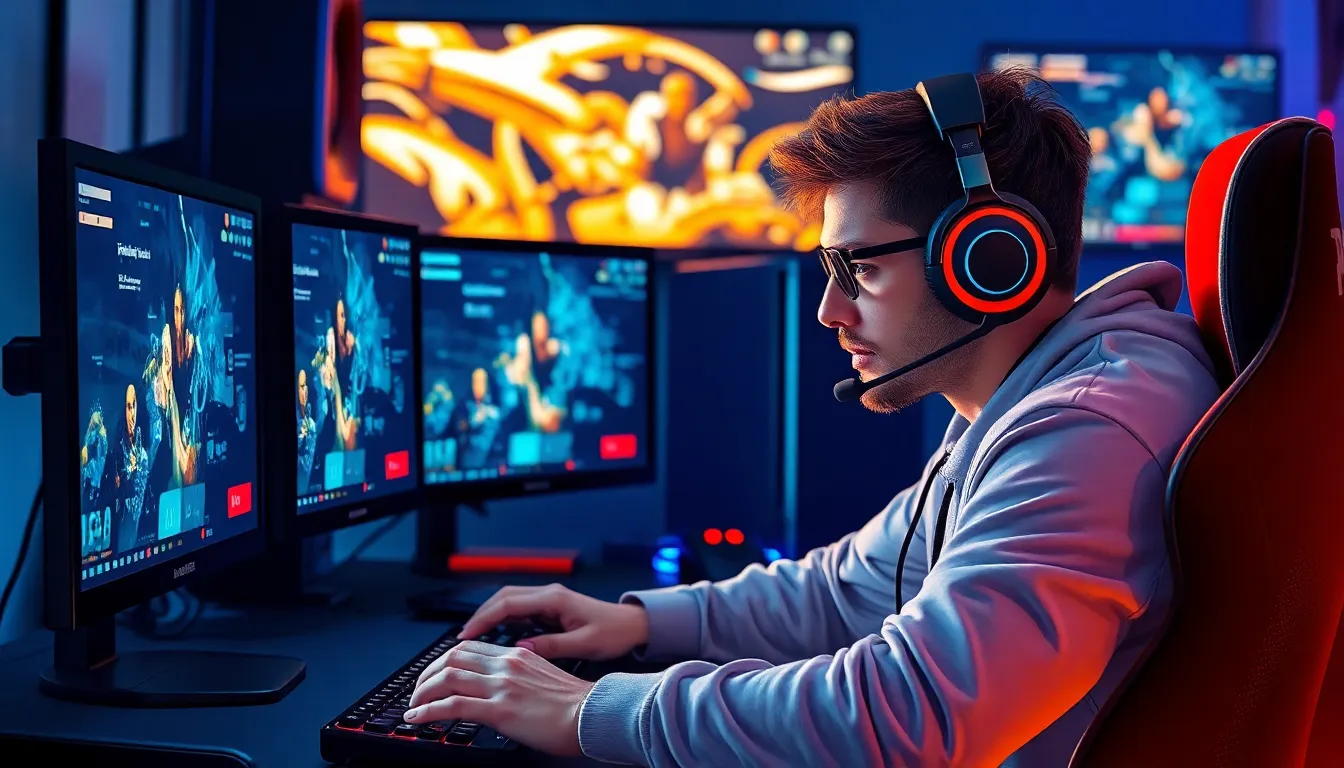
Pro gamers possess a unique blend of skills essential for their success in competitive gaming. Mastery in both technical and soft skills plays a critical role.
Technical Skills
Precision in technical skills remains crucial for pro gamers. High-level familiarity with game mechanics enables quick and efficient execution of strategies. Reaction time often determines win or loss in matches. Understanding game physics, maps, and character abilities supports informed decisions during gameplay. Gameplay analysis, through reviewing past matches, enhances performance awareness. They also utilize tools like overlays and statistics to improve strategies. Engagement with various gaming platforms increases adaptability across different genres.
Soft Skills
Soft skills significantly impact a pro gamer’s ability to succeed. Communication with teammates enhances collaboration during competitive play. Time management enables effective training schedules and helps maintain a balance between gaming and personal life. Critical thinking allows for creative problem-solving during matches, especially under pressure. Resilience builds the capacity to handle losses gracefully while fostering a growth mindset. Additionally, teamwork ensures synergy in multiplayer settings, promoting shared goals among players. These skills create a supportive environment that fosters individual and collective improvement.
The Journey to Professional Gaming
Professional gaming demands immense dedication and a structured path. Aspiring gamers often follow rigorous schedules that encompass various training activities.
Training Regimens
Training regimens for professional gamers involve multiple hours daily. Players typically engage in practice sessions that last 8 to 12 hours, emphasizing skill improvement and strategy development. Drills focus on mechanics, reflexes, and game knowledge. Gamers analyze gameplay through recorded sessions, identifying strengths and weaknesses. Additionally, physical fitness plays a role; many incorporate exercise routines to enhance stamina and focus. Successful training often includes setting measurable goals to track progress and motivate growth.
Competition Participation
Participation in competitions represents a significant aspect of professional gaming. Players join local, national, and international tournaments, showcasing their skills against top competitors. Notable events like The International for Dota 2 gather thousands of spectators and offer substantial prize pools, sometimes exceeding millions of dollars. Regular competition fosters a deeper understanding of game dynamics and enhances players’ responsiveness to different strategies. Engaging with a community of like-minded gamers provides networking opportunities for collaboration and growth. Regularly facing high-level opponents cultivates resilience and boosts overall gameplay abilities.
The Gaming Community and Pro Gamers
Pro gamers play a vital role in shaping the gaming community and its culture. Their skills and achievements inspire gamers at all levels, fostering a sense of camaraderie and competition.
Influence on Gaming Culture
Pro gamers revolutionize gaming culture by setting trends and creating new standards. Their gameplay often influences how others approach strategy and teamwork in competitive settings. Many gamers imitate techniques used by their favorite pros, leading to the evolution of new playstyles. Events like tournaments and streaming sessions raise awareness of eSports, solidifying its status as a legitimate and respected form of competition. Popular games, such as League of Legends and Fortnite, have generated dedicated followings, largely thanks to the visibility pro gamers provide. Engaging personalities attract fans, forming communities that extend beyond the screen.
Social Media Presence
Pro gamers leverage social media to connect with their audience and share insights. Platforms like Twitch and YouTube allow gamers to stream live gameplay, showcasing their skills and building personal brands. Engaging content captures attention, turning ordinary gameplay into entertainment. Gamers also use social media for community interaction, answering fans’ questions and providing tips for improvement. This presence cultivates a loyal following, bridging the gap between gamers and fans. Social media permits immediate communication, enabling pros to promote upcoming events and tournaments efficiently. The relationship between pro gamers and their audience reinforces community engagement and support within the gaming ecosystem.
Challenges Faced by Pro Gamers
Pro gamers encounter numerous challenges that test their skills and resilience. Managing time effectively is essential, as they need to balance rigorous practice schedules with personal commitments. Competing at a high level frequently leads to physical and mental fatigue, pushing them to develop better coping strategies.
Intense competition raises the stakes, creating pressure to perform consistently. They often experience burnout from the demanding nature of tournaments and continuous practice. Navigating the gaming landscape requires adapting to evolving game mechanics and strategies, necessitating ongoing learning and flexibility.
Additionally, the financial aspect poses challenges. Prize money can fluctuate significantly, making income unpredictable. Sponsorship deals vary in value, requiring gamers to secure multiple partnerships to maintain financial stability.
Moreover, maintaining a strong online presence is crucial. Gamers face pressure to engage with followers on platforms like Twitch and YouTube while ensuring they produce consistent, quality content. Balancing entertainment value with competitive performance remains a delicate challenge.
Conflict with team dynamics can also emerge. Collaborating effectively requires communication and conflict resolution skills. A harmonious team environment enhances overall performance, but discord can hinder progress.
Lastly, public scrutiny amplifies challenges. With fans and critics closely watching, every decision is subject to analysis. They must develop resilience to handle both praise and constructive criticism, as maintaining a positive mindset is vital for success in the competitive gaming scene.
Conclusion
The world of professional gaming is a dynamic landscape where skill and dedication reign supreme. Pro gamers not only entertain but also serve as role models for aspiring players. Their commitment to excellence fosters a vibrant community that thrives on competition and collaboration.
As they navigate the challenges of intense practice schedules and public scrutiny, these athletes redefine what it means to be successful in the gaming realm. The blend of technical prowess and soft skills showcases the complexity of their craft.
With the continued growth of eSports, the influence of pro gamers will likely expand, inspiring future generations to pursue their passions and elevate the gaming culture.

